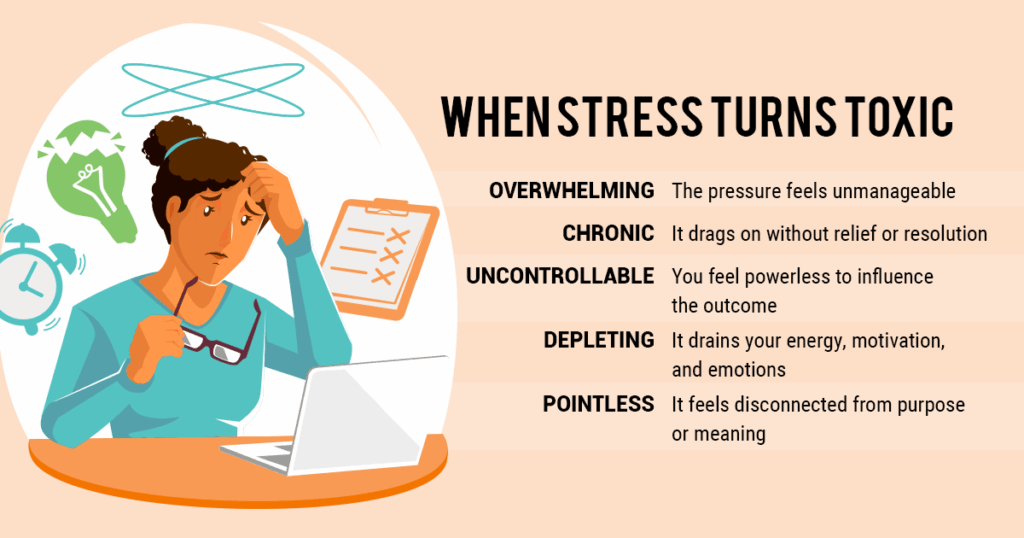Can Stress Be Good? Rethinking Stress and Stress Management
When most people hear the word stress, it carries a distinctly negative connotation. It’s commonly seen as something harmful and unavoidable—a force to endure, not embrace.
This view is understandable. A large body of research—spanning long-term health studies, lab experiments, animal models, and brain imaging—shows that chronic stress can disrupt nearly every system in the body. It contributes to inflammation, accelerates disease progression, and may even shorten lifespan.
The media often echoes these warnings, portraying stress as something to eliminate or at least tightly manage.
And on a personal level, that message resonates. Stress often shows up as headaches, muscle tension, digestive issues, or disrupted sleep. Emotionally, it brings anxiety, irritability, and a sense of overwhelm.
When Stress Turns Toxic
What makes stress feel corrosive? The issue often lies not in the mere presence of stress, but in the form it takes.
Stress tends to become harmful—even toxic—when it meets one or more of the following conditions:
- Too Intense: The pressure feels crushing.
When demands outweigh your capacity to cope, even small problems can feel overwhelming. - Chronic: It drags on without relief.
While short bursts of stress can be energizing, long-term, unresolved stress gradually wears down the body and mind. - Out of Your Control: You feel powerless.
A lack of agency intensifies stress. When you can’t influence outcomes — at work, in relationships, or with your health — it becomes more psychologically damaging. - Emotionally Draining: It leaves you burned out.
Some stress doesn’t just challenge you — it depletes you. Over time, it erodes your motivation, creativity, and emotional well-being. - Pointless: It lacks meaning.
People handle stress far better when it’s tied to something they value. When it’s disconnected from purpose, even minor demands can feel intolerable.
These are the hallmarks of toxic stress—the kind that wears us down instead of building us up. And they often don’t appear alone. They compound each other, amplifying the negative effects.

The Powerful Upside of Stress
Given how toxic stress operates, it’s no surprise that stress has such a bad reputation. But that’s only part of the picture, and that completeness is why the concept of stress could use rethinking.
Stress also has a powerful upside—one that’s fundamental to how we grow, thrive, and live meaningfully.
At our core, human beings are wired to seek purpose. We need meaning as much as we need food and air. And here’s the catch: every meaningful pursuit comes with stress. That’s not a design flaw—it’s how life works. Anything worth building involves pressure, resistance, and challenge—because that’s how the world is wired.
Whether you’re raising a child, launching a business, learning a skill, or healing from loss, you will feel stress. And that’s not something to avoid—it’s something to understand.
Why? Because this kind of stress—growth-oriented stress—fuels resilience. It focuses the mind, builds strength, and helps us evolve. It transforms us into more capable, wise, compassionate, and grounded versions of ourselves. The discomfort of doing hard things doesn’t just test us—it changes us, and we value that change.
What makes stress good isn’t the absence of difficulty—it’s the presence of purpose. When the struggle has meaning, it becomes a path to becoming a “bigger” person—someone who is more equipped to handle life, not less.
So don’t run from that kind of pressure. Embrace it. It’s not a glitch in the system—it is the system!
Final Takeaway
Stress is not inherently good or bad—but it can serve as a signal. It may reveal what matters to us, what feels threatened, or where we need to grow. What counts is how we interpret that signal, how we respond to it, and how we channel it.
The goal isn’t to eliminate stress altogether—that’s neither realistic nor productive. Instead, we need to differentiate between toxic stress and growth-oriented stress, and shift more of our experiences into the zone that strengthens us.
Toxic stress—chronic, meaningless, or overwhelming—wears us down. But stress that’s tied to purpose and aligned with our values? That kind of pressure can sharpen us, energize us, and help us evolve.
Effective stress management doesn’t mean avoiding discomfort. It means learning to work with stress in a way that helps us stretch without snapping—reducing what corrodes us while embracing what builds us.
In the posts ahead, we’ll explore practical, science-backed strategies for rethinking stress intended to help you release the stress that holds you back and harness the stress that moves you forward.
Your journey to smarter, healthier stress starts here.



